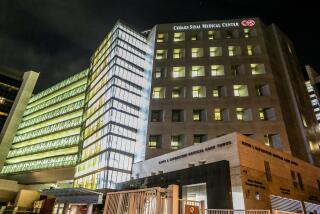4 patients say Cedars-Sinai did not tell them they had received a radiation overdose
- Share via
Cedars-Sinai Medical Center did not tell all 206 patients who received radiation overdoses during CT scans of the hospital’s error, according to the accounts of four people who said they only came to understand what happened to them through news reports.
In a statement last week, hospital officials said all the patients had been contacted “in the interest of keeping them informed.”
But in interviews with The Times, four people said that although they were called and questioned by Cedars-Sinai radiologists last month, the doctors neither acknowledged any error nor explained that the patients had been exposed to eight times more radiation than necessary.
“The word ‘radiation’ never came out of his mouth,” said Larry Biggles, who described a brief call he got in late September, a year after he arrived at the emergency room and a scan revealed that he had suffered a stroke.
He said that Dr. Barry D. Pressman, chairman of the imaging department, explained that he was following up on the scan and wanted to know whether Biggles had suffered headaches, blurred vision or hair loss.
Two days after the scan, Biggles had lost clumps of hair in the shower, leaving him bald from the tops of his ears to his neck. The hair had since grown back, he told the doctor, and that was the end of the conversation.
“He never said that we messed up and gave you an overdose of radiation,” said Biggles, a 51-year-old dispatcher for a messenger company.
At least now, he said, he knows to be on the alert for any long-term effects.
In a written statement Monday, Pressman said that the radiation was not outside the range used in other medical procedures -- such as angioplasties -- and that his goal in speaking with patients was “to address any side-effects that may occur, without unnecessarily alarming them.”
He said that any questions, including those about radiation levels, were addressed. “I sincerely regret if any patient feels that they did not receive the information they needed,” he said.
Cedars-Sinai has said the overdoses stemmed from an error made when the hospital reconfigured a scanner to improve doctors’ ability to see blood flow in the brain.
The faulty scans began in February 2008 -- after the computerized protocols were modified -- and continued until this August when the hospital discovered the error after learning of a patient’s hair loss.
The machine in question was used to perform various types of scans but the problem was limited to CT brain perfusion scans, which are used to diagnose strokes.
Under normal circumstances, the procedure uses more radiation than most other CT scans. It lasts up to a minute as the patient is injected with an iodine solution and a rapid series of X-rays are taken to create a detailed picture of blood flow in the brain.
The most serious risk from the radiation overdose is a brain tumor. Radiation experts said that chance is remote, perhaps 1 in 600 for each scan.
Because the risk from radiation is cumulative and cancers can take decades to develop, younger patients who received multiple scans face the greatest danger. Older patients are likely to die of causes unrelated to the radiation. The median age of those affected at Cedars-Sinai is 70.
If harm was done, the hospital would have a legal obligation to tell patients of any mistake, said George Annas, an ethicist and lawyer at Boston University. But legal responsibility is fuzzy in this case, he said, and comes down to how harm is defined.
From an ethical standpoint, he said, Cedars-Sinai should have fully informed all the patients of the error. “This is part of a trend in patient safety,” he said. “Whenever you make an error, you tell the patient.”
He dismissed arguments that revealing a small risk would lead to needless worrying, saying that full disclosure fosters trust between doctors and patients.
The Times interviewed five patients who said they received the radiation overdose and were contacted by Cedars. One said she was informed of the overdose. The others said they were not told and gave strikingly similar accounts of their conversations with the radiologists.
“He said, ‘Did you have any side effects, such as reddening of the skin or hair loss,’ ” recalled Linda Morrow, whose scan in February showed that she had not suffered a stroke.
“I said no. He said, ‘Well, thank you very much,’ and he hung up,” she said. “I thought: ‘What the hell was that?’ ”
Morrow, 69, had already survived multiple myeloma, a cancer of the blood. “I went through all of that so wonderfully,” she said of the stroke scare. “Then to pick up the paper and discover I got hit with this overdose is demoralizing.”
Trevor Rees, who was scanned twice in the wake of a December stroke, said the doctor who called told him: “Nothing’s wrong. Everything is OK. We wanted to know if you had some hair loss.”
The 65-year-old told the doctor his hair was thinning, but never came out in clumps. “He said, ‘Don’t worry about it,’ ” Rees recalled.
“I’m scared,” he said. “I don’t want brain cancer. I want to get my life back.”
Another patient, who is 43, said the call he received from Pressman seemed like an “investigation.”
The patient requested that his name not be used because as a mid-career professional, he did not want employers to know that he had suffered a stroke.
He had the impression that he was part of a suspect group but never asked what it might be. The doctor never gave him any indication that he was overdosed, he said. Afterward, the patient looked up Pressman online and saw that he was the head of imaging. He thought it was bizarre that the department chair would be calling him months after a scan.
Now he is worried because of his young age and the fact that he received two scans that day at the emergency room.
The discovery of the overdoses at Cedars-Sinai prompted the U.S. Food and Drug Administration to issue an alert warning hospitals nationwide to check the settings on their scanners.
The patients’ complaints raise similar issues to those that arose from another high-profile error at Cedars-Sinai in 2007. In that case, Cedars did not tell actor Dennis Quaid and his wife that their newborn twins had been overdosed with a blood thinner. The couple said they learned of the problem the next day, when they arrived at the hospital and were met by risk managers.
More to Read
Sign up for Essential California
The most important California stories and recommendations in your inbox every morning.
You may occasionally receive promotional content from the Los Angeles Times.











